
If you have a deep love for animals and dream of working closely with them in a unique and educational environment, a career as a zookeeper might be the perfect fit for you. This comprehensive guide will walk you through the steps to become a zookeeper, including education, experience, and essential skills required for this rewarding profession.
Step 1: Self-Assessment and Preparation
Before embarking on the journey to become a zookeeper, it's crucial to assess your passion for animals and your willingness to commit to their well-being. Zookeeping can be physically demanding, emotionally taxing, and requires a strong sense of responsibility.
Step 2: Educational Requirements
While some entry-level positions may only require a high school diploma or GED, pursuing a relevant degree significantly enhances your chances of becoming a zookeeper. Consider the following educational paths:
a. Bachelor's Degree: Many aspiring zookeepers choose to pursue a bachelor's degree in fields such as Biology, Zoology, Animal Science, Wildlife Management, or a related discipline. A degree in one of these fields provides a strong foundation in animal biology and behavior.
b. Internships and Volunteer Experience: While completing your degree, take advantage of internships and volunteer opportunities at local zoos, aquariums, or wildlife rehabilitation centers. Hands-on experience is invaluable and can help you build connections in the field.
Step 3: Specialized Training and Skills
To excel as a zookeeper, you must develop specialized skills and knowledge, including:
a. Animal Behavior: Understanding animal behavior is essential for identifying signs of stress, illness, or discomfort in animals under your care.
b. Physical Fitness: Zookeeping can be physically demanding, as it often involves heavy lifting, cleaning, and working in all weather conditions. Maintaining good physical fitness is crucial.
c. Communication: Effective communication skills are essential for working with colleagues, veterinarians, and educating the public about the animals in the zoo.
d. Animal Nutrition: Learning about the dietary needs of different species and how to prepare and provide food is a critical aspect of zookeeping.
Step 4: Gain Practical Experience
Practical experience is a vital component of becoming a zookeeper. Seek internships, part-time jobs, or volunteer positions in animal-related settings. This hands-on experience will allow you to work directly with animals, develop essential skills, and demonstrate your commitment to potential employers.
Step 5: Network and Build a Portfolio
Networking within the zookeeping community can open doors to job opportunities. Attend conferences, workshops, and events related to animal care. Build a portfolio showcasing your experience, skills, and any specialized training you've received.
Step 6: Apply for Entry-Level Positions
Begin your career by applying for entry-level positions such as animal keeper assistant or zookeeper trainee. These roles provide an opportunity to gain experience and demonstrate your dedication to animal care.
Step 7: Continuing Education and Advancement
Continuing education is crucial for career growth in zookeeping. Consider pursuing certifications or advanced degrees related to animal care and management. As you gain experience, you can apply for more specialized roles, such as curator or animal behaviorist.
Step 8: Professional Organizations
Joining professional organizations like the American Association of Zoo Keepers (AAZK) can provide valuable networking opportunities, access to resources, and a platform to stay updated on industry best practices.
Becoming a zookeeper is a fulfilling journey for those who are passionate about animals and conservation. It requires dedication, education, practical experience, and a lifelong commitment to the welfare of the animals under your care. By following the steps outlined in this guide, you can embark on a rewarding career that allows you to make a positive impact on the lives of animals and educate the public about the importance of wildlife conservation.
TS ICET 2023 Counseling: Phase 1 Registration Deadline Today
National Teachers' Award 2023: A Beacon of Education in Manipur's Keibul Lamjao
G20 Leadership Transition: Symbolic Handover from India to Brazil, Unveiling the Next Troika